On this date in 1875, Edgar Rice Burroughs was born in Chicago. He graduated from the Michigan Military Academy in 1895 and enlisted in the U.S. Army in 1896 but was discharged after only a year due to a heart condition. He became a full-time writer of pulp fiction in 1912, the year he published his story “Tarzan of the Apes” in The All-Story Magazine. The story was an overwhelming success and Burroughs went on to publish 26 Tarzan novels, which became famous worldwide.
The novels detail the life of Tarzan, an Englishman who was raised by apes in the African jungle. The books have been made into over 50 different movies, beginning with the silent film “Tarzan of the Apes” in 1918, which was one of the first films to make over a million dollars. Tarzan novels have also been adapted into a 1932 radio drama, the Broadway play “Tarzan of the Apes” (1921) and Broadway musical “Tarzan” (2006), the Disney animated movie “Tarzan” (1999) and five television series.
Respect for his Tarzan stories has, despite their early popularity, diminished due to growing awareness of their implicit racist and imperialist prejudices that were rampant and rarely challenged in Western culture when he wrote them. Revised variations of the Tarzan theme in multiple genres since then have tackled the difficult task of reducing or removing the prejudices inherent in the core of the Tarzan concept, with varying degrees of success.
Burroughs wrote 50 other books, many of which were science fiction, including A Princess of Mars (1912), At the Earth’s Core (1914) and The Cave Girl (1925). He married Emma Hulbert in 1900 and had three children: Joan, John and Hulbert. They lived in Tarzana, Calif., which Burroughs founded in 1928.
On July 6, 1925, Burroughs published an article supporting evolution. He wrote, “If we are not religious, then we must accept evolution as an obvious fact. If we are religious, then we must either accept the theory of evolution or admit that there is a power greater than that of God.” Burroughs’ novel The Gods of Mars (1918) contained freethought themes, describing a deeply religious society where religion was a myth perpetuated as a way to cover up murder.
He died of a heart attack at age 74 at home in Encino, Calif. He was inducted into the Science Fiction Hall of Fame in 2003. (D. 1950)


